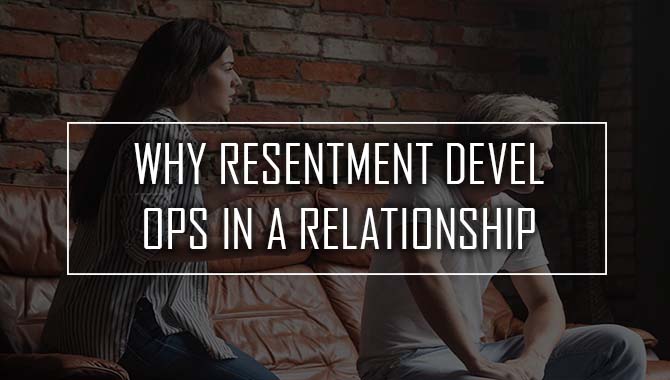Resentment is a toxic emotion that can easily take root in relationships. It can cause tension and pain, as well as damage to both parties involved. However, with the right attitude and some effort, you can work to overcome Resentment and build a stronger, healthier relationship. This blog will discuss the various causes of Resentment and how you can work together to find solutions.
We’ll also provide some tips on how to show respect for your partner, prevent blame games, and help restore harmony in your relationship. So whether you’re suffering, please read our article on why Resentment develops in a relationship.

Resentment In Relationships

Resentment is one of the most destructive emotions that a person can experience in a relationship. It destroys the bonds of trust essential for a healthy relationship and can eventually lead to divorce. Relationships are supposed to be full of love and happiness, but sometimes things don’t go as planned. When this happens, Resentment can develop.
Resentment is a natural emotion that develops when we feel neglected or unfulfilled in our relationships. It can create difficulties in the relationship and affect both partners negatively. To avoid Resentment developing, give your partner their needs and express your feelings openly.
Additionally, please make an effort to solve any problems as soon as they arise. This way, tensions won’t build over time, and the relationship will remain healthy and happy.
8 Causes Why Resentment Develops In A Relationship

Resentment can develop in any relationship, no matter how strong it is. Resentment can form when one partner feels taken advantage of, neglected, or doesn’t feel heard. This can lead to issues like difficulty in communication, keeping secrets, and feelings of powerlessness. Resentment will most likely happen if both parties have valid concerns but cannot express them effectively.
And as with any relationship, You can overcome Resentment with sincere and honest communication. So, if you’re resentful in your relationship, it’s important to identify the root of the problem and address it as soon as possible. It may not be easy, but it’s worth it.
Feeling Ignored.
If you feel resentful in a relationship, it might be because one or both of you are always doing all the work. In this scenario, Resentment will inevitably develop as the other person feels ignored and unimportant. It is important to be communicative and listen to your partner’s needs to avoid Resentment from developing.
If you notice that things are starting to get sour between you two, take some time out and talk about it calmly before making any rash decisions. Even if resolving the issue seems impossible at first sight, give it a try – sometimes, things can change when both parties begin recognizing their feelings.
Arguing Too Much.

Talking too much is one of the surest ways to get into trouble in a relationship. Not only will this lead to Resentment, but arguments can easily ensue when we discuss trivial topics. The best way to avoid conflict is to be more understanding and patient with your partner. This doesn’t mean letting them walk all over you.
It means being able to listen attentively without getting defensive or argumentative. Communication should always involve honesty and openness so that misunderstandings don’t arise in the first place.
You Keep Finding Faults In Your Partner.
Regarding relationships, some people are prone to getting angry and resentful very easily. This might be due to certain personality traits or past experiences. Regardless of the reason, when this happens, it’s often hard for things to improve as tensions build up over time. Here are four signs that you’re dealing with relationship problems in a negative way:
- You find faults in your partner even if there is no real reason for doing so.
- You start nitpicking everything your partner does – regardless of how small the issue may seem at first glance
3 . You take things out of context
4 . And you gradually start seeing your partner less and less as an individual – instead of perceiving them solely through the lens of their flaws.
You Use Passive-Aggressive Behavior.
Passive-aggressive behavior occurs when someone behaves in a way that is not overtly hostile but produces the same result – tension and conflict. They might use negative statements to put their partner down, withhold affection and attention, or never be content with what the other person does. This can lead to strained relationships where both partners feel resentful and insecure.
One Of You Physically Or Emotionally Withdraws From The Relationship.

If one of you starts to feel Resentment towards the other for withdrawing emotionally or physically, it might be time for a break. This could mean taking some time away from the relationship on your part or on behalf of your partner.
If this pattern continues and does not seem like it’s going to change any time soon, it might be best to seek professional help to restore and rebuild Shattered Trust.
You Need To Learn How To Fix The Problem In Your Relationship.

Resentment is never healthy and should be avoided at all costs. It is often a sign that communication issues or other problems are brewing in a relationship. Relationships are supposed to be based on mutual respect and understanding.
However, suppose one person in the relationship needs to understand why their relationship isn’t working. In that case, they will likely try to fix it themselves instead of asking for help from the other person.
This is because people often think they know best about relationships and how to fix them. However, this is rarely the case. In most cases, the problem lies elsewhere. The way that one or both are approaching. Or the issues that they need to address before anything else can happen in a relationship.
You Have Unfilled Or Unspoken Expectations.
Resentment is a feeling of hostility and anger directed toward another person. When one person in a relationship feels unfulfilled or unacknowledged, Resentment can develop due to many factors. These include not getting what you want, feeling neglected or left out, and more. If these issues aren’t addressed early on, they may spiral and lead to Resentment in the long term – often leading to conflict and unhappiness.
The best way to prevent this is open communication – where you and your partner are willing to share your feelings honestly and look for ways to resolve the issue(s). This will help build trustworthiness within the relationship over time.
One Of You Always Spends Time Away From The Other And The Relationship.

When one of the members in a relationship is always away or spends most of their time away, it can lead to a lot of Resentment. This situation often becomes unbearable for one partner who feels like they are constantly putting in more effort than the other person and don’t receive any recognition or respect. This creates an imbalance in the relationship, which inevitably starts to deteriorate.
How To Prevent Developing Resentment In Your Relationship

Resentment is a dangerous emotion that can have lasting and detrimental effects on a relationship. It’s natural to react when we feel disrespected, and Resentment is often the result. If you don’t want your relationship to be plagued by Resentment, it’s important to understand the causes and develop strategies to prevent it from happening.
One of the main causes of Resentment is when one person feels disrespected. If you’re conscious of how you communicate and interact with your partner, Resentment will be hard to build up and sustain.
Communicate With Your Partner.

Every relationship goes through ups and downs. However, when Resentment starts to develop, it can cause significant damage. Resentment is a negative feeling that arises when one person isn’t communicated with healthily. This often leads to Resentment because the other person feels unheard and unsupported.
Regularly communicating with your partner is the best way to prevent Resentment from developing. When something important comes up, feel free to address it as soon as possible. Doing so will help to keep the relationship healthy and Resentment at bay.
Be Honest With Your Partner.
A healthy relationship builds on open communication. It starts with being honest with each other, and Resentment can grow if one partner isn’t truthful. That’s why starting your relationship on the right foot is important by being upfront with your feelings and needs from the beginning.
No one deserves to be in a relationship where they’re constantly feeling Resentment, so honesty is the key to a long and happy relationship.
Work On Solutions To Your Resentment Problems Together.

Resentment can develop in a relationship due to different problems the couple deals with. For example, one person might feel Resentment because their partner doesn’t pay enough attention to them. If this problem isn’t resolved, Resentment will grow and negatively affect the couple’s relationship. It’s important to work together on solving these issues, so Resentment doesn’t grow further.
By talking about your feelings and finding solutions to your problems, you can prevent Resentment from developing in the first place. If you notice any signs of Resentment developing, talk to your partner about it as soon as possible! In the end, a healthy relationship is built on communication, and Resentment is one of the biggest roadblocks to creating a strong connection.
Please Show Respect For Your Partner And Their Point Of View.

Relationships are a two-way street. It’s not about taking and never giving back – that’s not healthy or sustainable. Resentment develops when one party feels disregarded or taken advantage of. To prevent this from happening, show respect for your partner’s point of view. This will help them feel appreciated and loved.
They will then be more likely to open up and discuss their concerns, which will ultimately help to resolve any issues. Creating an atmosphere where both partners feel safe and heard to prevent Resentment from developing in the first place is essential.
Don’t Play The Blame Game.

In any relationship, there will be times when things don’t go as planned. This can lead to Resentment as one partner takes advantage of the relationship. To avoid Resentment, be honest and respectful from the start. This means being willing to communicate openly and honestly about your feelings.
Avoid accusing each other of things you can’t control, like events that have happened in the past. Lastly, focus on positive communication and let go of negative thoughts. This will help build a stronger relationship based on mutual respect.
Final Thoughts
Relationship resentment is a natural reaction to difficult or frustrating interactions in a relationship. It’s important to understand why Resentment develops and how to deal with it. Try focusing on the positive aspects of the relationship rather than what may be wrong.
By understanding the different causes of Resentment and how to work on solutions together, you can help your relationship thrive. Remember always to respect your partner and never play the blame game. Thank you for reading our article on why Resentment develops in a relationship. We hope this blog has provided valuable insights into the topic.
Frequently Asked Questions
1. What Causes Resentment In Relationships?
Ans: One of the main causes of Resentment in relationships is when one person feels undermined or ignored. This can happen from various sources, like feeling left out of conversations or not being included in decisions made about the relationship.
2. Is It Normal To Have Resentment In A Relationship?
Ans: Yes, it is normal to have Resentment in a relationship. Resentment can develop when someone feels ignored or abandoned by their partner, and it’s important to be honest, and talk about resentments with your partner so that both of you can work on resolving them.
3. Can A Relationship Recover From Resentment?
Ans: Both parties must be willing to work on repairing the damage caused to recover from Resentment in a relationship. This may require time and effort, but it’s ultimately worth it if you want your relationship to last.
4. How Does Resentment Build Up, And How Do You Stop It?
Ans: Resentment starts with feeling unseen or unheard by your partner. This can result in your partner not paying attention to you, ignoring your needs, or talking to you. Next, Resentment might lead to anger and conflict. This can be when your partner doesn’t agree with you, speaks over you, or makes you uncomfortable.
5. Why Do Most Relations Not Last Long/Forever?
Ans: One of the most common reasons relationships don’t last is that people cannot understand and accept each other’s differences. This can be difficult, especially if one party feels uncomfortable with those differences.

Leave a Reply